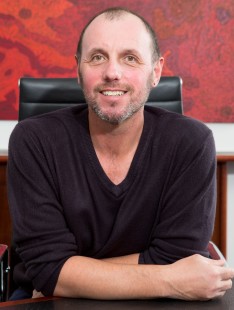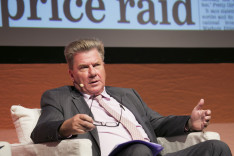From Chris Mitchell to Boris, life under leaders new and old at The Australian
 Life working on The Australian under Chris Mitchell was never dull. Ex-Australian journalist Simon Canning looks at what has been and what is to come under new boss Paul Whittaker.
Life working on The Australian under Chris Mitchell was never dull. Ex-Australian journalist Simon Canning looks at what has been and what is to come under new boss Paul Whittaker.
And so Chris Mitchell has gone, his departure from The Australian met with a measure of relief by those working at the coalface of the national broadsheet, mixed with a level of trepidation about the arrival of Paul “Boris” Whittaker.
In the pair, the master and his apprentice, there could not be two characters more different in their approach to achieving the same ends.
What those ends are, of course, depends on where you view The Australian from: internally it is seen as the paper of record for Canberra and the driver of the national debate; from Canberra a powerful arm of the most powerful media baron in the world to be feared and courted in equal measure; and from the perspective of rivals such as Fairfax and the ABC, it is a savage competitor willing to take no prisoners regardless of the concepts of editorial balance.
It was, in reality, all of these and yet none of these.
And there was perhaps no better place to witness Mitchell’s rule over the Oz and what the future may holds under the reign of Whittaker than the bunker of the Media Section.
I spent almost a decade on the Australian until 2012, including the five years when Whitaker was editor.
During that time it was easy to witness the transformation of the paper as Mitchell’s self-belief grew – a self belief that was supported by the fact that he knew just who’s show it was he was running.
He is the man who could read his master’s voice better than anyone and that allowed him the room to set the agendas that so angered The Australian’s critics on issues such as climate change and the NBN.
Running the paper from the cockpit of his office, Mitchell was rarely on the newsroom floor. Those on the newsdesk were despatched with tips and suggestions – but rarely if ever directives.
Mitchell’s playing field was conference, where his intellect – if not quite as towering as then media editor Sharri Markson suggested in a fawning piece, where she said he was “truly an expert on most policy subjects, Mitchell has a photographic memory”, – would be displayed. He could sit quietly taking in a newslist, before ambushing the editor with a completely new take on a story, or tearing the premise to shreds with a simple analysis.
Bollockings from Mitchell were rare, but to be avoided at all costs.
Perhaps one of the flaws that did emerge in Mitchell was the belief of being right. As Markson noted in her piece, he pursued the stories others wouldn’t.
But it was a double-edged sword – The Australian Wheat Board scandal and the Haneef Affair are examples of the fact that that Mitchell would back his journos to the hilt for award winning stories.
 My own experience after slamming the Tourism Australia ‘Where the Bloody Hell Are You’ campaign in The Australian was proof of that.
My own experience after slamming the Tourism Australia ‘Where the Bloody Hell Are You’ campaign in The Australian was proof of that.
Despite pressure from TA managing director and future treasurer Scott Morrison, TA chairman Tim Fischer and Tourism Minister Fran Bailey to bring me into line, and the fact TA was an important commercial partner for the paper, nothing was ever said.
Mitchell’s other flaw was his hatred of the internet as an interloper on the journalism The Australian was trying to sustain.
It was something he never quite got, with one former journalist on the paper noting that “Chris would have smashed the internet to pieces if he could”.
It manifested itself in the Media section’s damning coverage of Fairfax’s Digital First strategy.
Mumbrella was one interloper on Mitchell’s mind and in one meeting with the media team talking about future online coverage he suggested eight “exclusives” a day in the Media section’s web page was the way to deal with Mumbrella and other new digital players.
While that was never going to happen, The Australian became increasingly peppered with red “exclusive” banners.
One digital move Mitchell did support was the paper being the first in the country to launch on the iPad.
The evolution of the media section has been a barometer of the newspaper itself.
At launch under the guidance of Campbell Reid it strove for an independent voice that was vital for the the section’s success. This continued for several years under the guidance of Martin Beesley, the paper’s managing editor and a former editor of The Daily Telegraph, who was able to deal with Mitchell and pressures from other editors, as well as Mahogany Row (the top managers at Holt Street) as an equal.
However that independence slowly eroded as new editors took over what was seen as the most challenging section to edit in the building.
One by one, staff left the section and it shrank inline with the paper’s own advertising fortunes – although it had never been a revenue stream.
And so to Boris, and where he will take the paper.
Philosophically, nothing will change, and that is the point.
But from the perspective of the newsroom, life under Boris will be very different.
Known for rolling up his sleeves and getting stuck in, there will be none of the subtlety of Mitchell’s reign and he will be a common sight on the newsroom floor. His tabloid instincts – far stronger than Mitchell’s – will need to be kept in check.
In that light, the role of Editor Clive Mathieson, will be pivotal as a calm operator.
If Mitchell’s rule of The Australian was entertaining as a Machiavellian play, Whittaker’s time will be loud, abrasive and, if you see things from the right perspective, equally as fun.
- Simon Canning is a journalist at Mumbrella and was a marketing and advertising writer on The Australian for nine years






What if they publish a product and no one notices? Essentially that is where the trend is going. Cannings account of the evaporation of value in the media section corresponds with equal collapse elsewhere. Nowhere more obvious than the opinion/news pages where repetition and stridently asserted views are presumed to be at the same time authoritative.
[Edited under Mumbrella’s comment moderation policy]
User ID not verified.
It seems pretty clear that both editors are more interesed in aggressive vendetta journalism and ideological warfare, rather than pushing for stories that are actually in the public interest. In most cases, and especially in recent times, they have failed to drive decent journalism. But they’ve also both failed on the other main KPI of a newspaper editor – boosting circulation and profits. The Australian has abysmal readership figures, while the Tele’s circulation dropped heavily during Whittaker’s reign, and its website never appears in the top 10 Aussie news sites. So what are they good for? Scaring gullible/weak politicians seems to be it.
User ID not verified.
(quote)
“I spent almost a decade on the Australian from 2013, including the five years when Whitaker was editor.”
(unquote)
Great to see The Oz has a future until at least 2023.
User ID not verified.
Is this piece being written from the future? You stated in 2013 at The Aus and were there for nearly a decade?
User ID not verified.
Oz is an ideological pamphlet, not a newspaper. A very expensive ideological pamphlet.
Will the leadership change alter any of the this?
User ID not verified.
If the Tele and the Oz still had the power they’d like us to think they have, Abbott would still be PM and Turnbull just a minister with a preferred leader rating in the low single digits. Notice how pollies that strictly tow the News Corp & 2GB line actually poll terribly and generally fail politically? The sooner they realise these Murdoch pamphlets no longer influence Australian voters, the better.
User ID not verified.
That should read ‘If Mitchell’s rule of The Australian was entertaining as a Machiavellian play, Whitaker’s time will be loud, abrasive and, if you see things from the FAR right perspective, equally as fun’.
User ID not verified.
One of the interesting this about Chris Mitchell was the way he would sometimes pick a particular individual he didn’t like and just hammer on them no mater how un-edifying it got.
His obsession with Robert Manne is the classic example. It was odd, as there are many high profile people who shared Robert Manne’s views on the Stolen Generations – but for some reason Manne got picked by Mitchell as someone he wanted to sink hours of staff time into. It just never seemed to occur to him that a using a national paper to attack a private enemy was highlighting to the public just how small-town the Oz was.
People who have actual lives didn’t care who wasn’t getting a Christmas card from Mitchell. They never seemed to realise how off putting this kind of thing was to actual readers living actual lives. Its no surpries retirees were their main readers.
If the new boss is same as the old boss but with a dash of extra tabloid….its over for the Oz very soon. Can you imagine anyone in Melbourne, Perth, Adelaide, Hobart or Darwin picking up a copy when Whittaker starts running grudge editorials against his enemies in Sydney and Canberra? Me neither.
User ID not verified.
I don’t care anymore. The well has been poisoned for too long. I really need more balance. I cancelled my subscription a couple of years ago. When I get a free copy at the gym it is still only a skim read. It really is a shame. I reckon they should be feeling the guilts for ruining the paper.
User ID not verified.
Good insight, Simon!
User ID not verified.
what’s the bet the Australian will now ramp up their current white ant ing of Malcolm Turnbull in a pathetic attempt to reinstall an ex PM Australians don’t ever want back. That’s the arrogance of the right wing.
User ID not verified.
Psst!
2nd par…Paul “Boris” Whitaker.
6th par….when Whitaker was editor.
Last par…as a Machiavellian play, Whitaker’s time will be loud….
Whitaker? Whittaker!
User ID not verified.
Thanks Simon. The sub editors on The Australian are among the best in the world and I relied on them heavily. Apologies to Paul.
Mumbrella will have sub editor on deck soon to keep this sloppy journalist in line.
Simon
Mumbrella
“If the Tele and the Oz still had the power they’d like us to think they have…”
Not a good example. News turned on Abbott after he shit-canned changes to the cross-media ownership laws, robbing Murdoch of his opportunity to buy Channel 10 and turn it into Fox Lite.
Go back through the stories and you’ll see a sudden shift in rhetoric, from ‘Yay, Abbott,’ to ‘Fuck this guy.’
Also right before Abbott’s dumping Murdoch flew into Canberra and held a lengthy meeting with Scott Morrison.
So maybe they do have the power they think they do, or are at least they were elbow deep in the leadership shenanigans.
User ID not verified.
Fred: The Daily Tele backed Abbott all the way to the very end. In fact, ‘backed’ is an understatement.
User ID not verified.